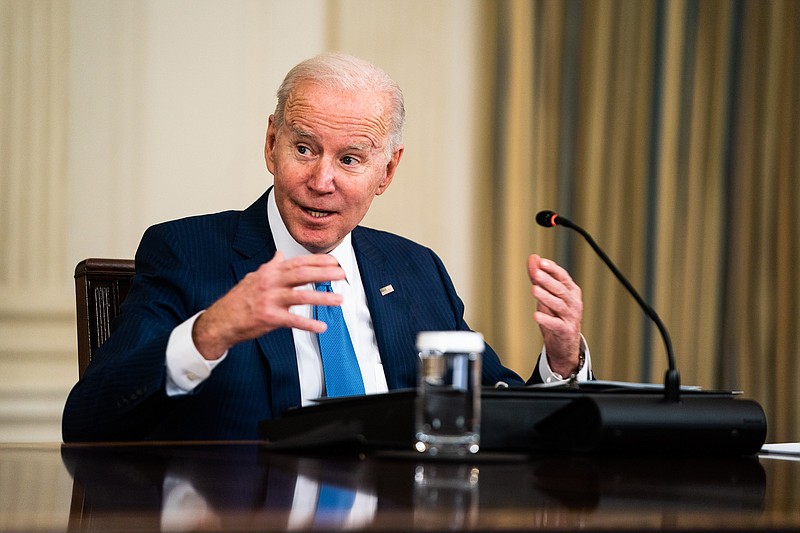WASHINGTON -- President Joe Biden on Thursday said he is "rejecting" the accounts of senior U.S. military commanders who told Army investigators that administration officials did not grasp the rise of the Taliban last year or how quickly the United States needed to prepare to launch an evacuation operation in Afghanistan.
Biden said in an interview that it did not ring true to him that administration officials ignored warning signs or were in denial about the situation.
"No," Biden said. "No. That's not what I was told."
The president, pressed on whether he was rejecting the accounts in the reports, said he was.
"Yes, I am," Biden said. "I am rejecting them."
The president addressed the issue in an interview with NBC News after The Washington Post reported Tuesday that the top U.S. commander on the ground during the evacuation, Rear Adm. Peter Vasely, and other military leaders involved told investigators that senior White House and State Department officials lacked a sense of urgency as the Taliban advanced on Kabul and for weeks resisted Pentagon efforts to prepare for the evacuation of embassy personnel and Afghan allies before the Aug. 15 fall of Kabul.
The criticism from military officials appeared in a U.S. Army investigative report numbering about 2,000 pages. The documents, obtained through the Freedom of Information Act, detail life-or-death decisions encountered by U.S. service members who were ordered to secure Hamid Karzai International Airport for what became a 17-day operation.
Days before the mission concluded, an Islamic State-Khorasan bomber attacked U.S. troops and Afghan civilians attempting to flee the country, killing 13 American service members and about 170 Afghans.
Biden administration officials have sought to downplay the significance of the report. State Department spokeswoman Jalina Porter said "cherry-picked comments do not reflect the months of work that were well underway, or the whole picture of what the U.S. diplomats undertook to facilitate the evacuation and relocation of U.S. citizens, lawful permanent residents and allies."
Biden on Thursday underscored his belief that it was time to withdraw, even as critics focused instead on the manner in which the United States left Afghanistan. About 600 U.S. troops were in Afghanistan in August, down from 2,500 early last year.
"Look, there's no good time to get out, but if we had not gotten out, they acknowledge that we would have had to put a hell of a lot more troops back in," Biden said. "It wasn't just 2,000, 4,000. We would have had to significantly increase the number of troops, and then you're back in this war of attrition."
After the central government fell, Biden ordered more than 5,000 additional U.S. troops to Afghanistan to assist with the evacuation. Marines and soldiers worked on the perimeter of the airport, screening the crowds for American citizens and Afghan allies who had assisted the 20-year U.S. war.
A White House official, speaking on condition of anonymity because of the sensitivity of the issue, said after Biden's interview that the president took office with a deadline for the U.S. military to withdraw but no plan to do so. Former president Donald Trump had signed an agreement with the Taliban to remove all U.S. troops by May 2021.
The official said "we immediately went to work planning for every aspect of leaving," including for an evacuation operation "that eventually helped more than 120,000 individuals fly out of Kabul in a few short weeks."
"Those months of extensive preparation, like the deployment of troops in the region, are reflected in the public record and the CENTCOM [U.S. Central Command] interviews," the official said. "We reject any assertion that claims otherwise."
Vasely told investigators that military personnel would have been "much better prepared to conduct a more orderly [evacuation] if policymakers had paid attention to the indicators of what was happening on the ground."
Brig. Gen. Farrell Sullivan, a Marine general overseeing aspects of the operation, told investigators that it was his opinion that the National Security Council "was not seriously planning for an evacuation."
Pentagon spokesman John Kirby said Wednesday that the report shows that a lot of good people across the U.S. government "were working hard under incredibly difficult circumstances to make the best decisions they could in real time," and that effort was unprecedented.
"Nothing like this had been attempted since the end of the Vietnam War," he said. "Everyone's heart, up and down the chain, was in the right place."
